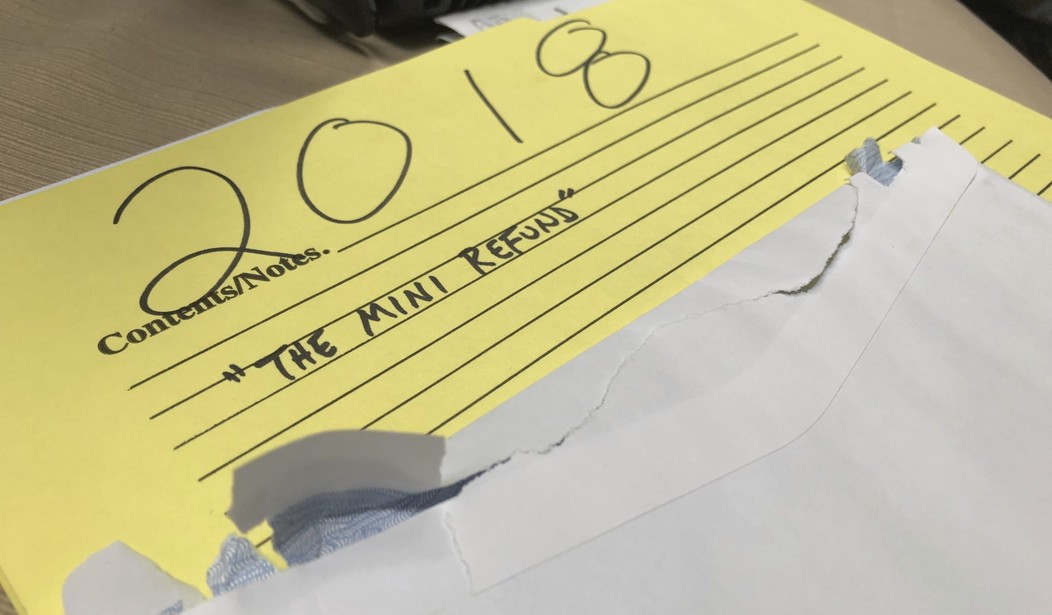In a typical example of leftist media bias, the Los Angeles Times has an article titled “Shrinking tax refunds are a growing problem for GOP tax law.” Uh-oh! Are people actually paying more in taxes under the new law?! That certainly seems to be the implication of the initial paragraphs:
Bill Forsythe, a 57-year-old hospital radiologic technologist in San Jose, plugged his and his wife’s financial information into TurboTax this month and, like many Americans filing early this year, was shocked at the bottom line.
After a sweeping Republican law went into effect with promises of lower taxes for just about everyone, the couple owed about $9,000 in federal and state taxes. Last year, they got a $6,000 tax refund on roughly the same income.
“I’m very frustrated and exasperated and angry that this government seems to have changed things for the worse considerably,” Forsythe said.
The couple’s case is far from unusual.
The average tax refund so far has shrunk to $2,640 from $3,169 at the same point last year, according to Internal Revenue Service data through Feb. 15 that were released late Friday. That’s a 16.7% drop.
The immediate question I had was simple: did the Forsythe family pay more in taxes last year? Or did they pay less in taxes, but also have less withheld? Because in the latter case, their smaller refund is actually a double bonus: they paid less money to the federal government, but they also made a smaller interest-free loan to the federal government.
As my federal income tax professor explained to us in law school, you should be furious any time you get a tax refund. Every dollar refunded to you is a dollar that you loaned to the federal government, without getting a cent of interest for your trouble. Most people aren’t in the business of loaning money for free, unless it’s to cousin Manny who’s down on his luck again and just wants a little money to tide him over until next month. (And let’s face it, that’s not really a loan because cousin Manny never pays you back.) Lending money to the federal government for free is a bad idea for several reasons. First, the federal government does stupid things with its money — like studying whether bugs are attracted to light, or paying DEA agents bonuses after they throw sex parties with prostitutes in government-funded buildings. If the feds want to borrow money to do those stupid things, they can jolly well pay interest to the lender. As for you, the poor sap who lent the government money for free: you could have been making interest on that money. You could have invested that money in Wall Street over the past year and… OK, bad example. But you could have put it to better use than lending it to Uncle Sam for nothing.
So: lower tax refunds are a good thing. Lower taxes are also a good thing, while higher taxes are bad. So what, exactly, are we talking about here in this L.A. Times article?
Well, reporter Jim Puzzanghera never quite gets around to telling us whether the Forsythes paid more in taxes this past year. It’s possible they did, of course; the GOP plan did eliminate or weaken tax breaks that helped people in blue states who pay high state income taxes, and other breaks that helped homeowners in high property-value states. This double whammy affects Californians — including some of us California conservatives (yes, we do exist) — and some Californians are paying higher tax bills this year as a result. But given that the L.A. Times doesn’t say that the Forsythes paid a higher absolute amount in taxes — and given that the L.A. Times is packed to the brim with leftists who love high tax rates, and consequently would love to tell you any bad facts they can about the GOP plan — I think it’s safe to assume that the Forsythes did not pay more in taxes. They just got a smaller refund.
What about the vast majority of Americans? Are they paying more in taxes? The answer is buried in an offhand remark contained in the ninth paragraph of the article — a paragraph that begins with the phrase “Republicans point out” … a phrasing designed to make the subsequent facts sound dubious even though they are true. See if you can spot the truth about whether taxes are higher or lower for most Americans:
Republicans point out that refunds, which usually reflect how much a person overpaid in taxes the previous year due to withholding, are different from actual taxes paid, which for most people are lower under the new law.
Still, news of the smaller refunds has been another hit to a tax law that has been much less popular than Republicans had expected. The latest problem reflects a potential political miscalculation made by Trump administration officials who perhaps didn’t take human psychology into account.
Finding meaningful nuggets of truth in this article is like spotting snow leopards in the wild: if you know exactly where to look and you squint really hard, you might catch a glimpse of one. Yes, there it was: “actual taxes paid … for most people are lower under the new law.” (Republicans say.) So it really is just a question of lower taxes and lower tax refunds — in other words, good news and even better news.
In classic L.A. Times fashion, though, having acknowledged the positive truth, however briefly, the reporter quickly moves to make it sound terrible:
Early last year, the administration decided to make greater-than-usual changes in federal tax withholding tables that immediately boosted workers’ income. That resulted in many workers getting a small amount more in each paycheck at the expense of a large refund when they filed their return.
Howard Gleckman, senior fellow at the left-leaning Urban-Brookings Tax Policy Center think tank, said that taxpayers could feel shortchanged even if they actually ended up paying less in taxes in 2018 than the year before.
If people judge the tax law by “the refund and not the total tax you pay — and the refund is lower than what you got last year — it stands to reason you’re going to be unhappy,” he said.
Nowhere does the article explain that receiving more money in your paycheck every week, rather than giving interest-free loans to the federal government, is a good thing — meaning that these people who are unhappy over their smaller refunds are simply (and I say this with the greatest respect) morons. The closest the article comes is to quote a Sacramento-based writer as saying: “‘It’s an interest-free loan to the government, but you never have to lose sleep at night’ worrying about a big tax bill.” Even the notion of free loans to the government is spun as a boon to taxpayers, allowing California novelists to sleep well at night knowing that they have allowed the federal government to use some of their money for free.
In the end, the article is nothing more than a way to reinforce Democrat talking points, such as this nonsense from Kamala Harris (quoted in the article):
The average tax refund is down about $170 compared to last year. Let’s call the President’s tax cut what it is: a middle-class tax hike to line the pockets of already wealthy corporations and the 1%.
— Kamala Harris (@KamalaHarris) February 11, 2019
Harris’s claim cannot properly be described without using profanities that would befoul this family publication. So let’s just point out that she is flatly wrong — as even the “fact checkers” at the #FAKENEWSBEZOSPOST were forced to concede when they gave two Pinocchios to a Democrat who claimed that 83 percent of the benefits in the GOP tax bill are going to the top one percent. The actual facts are quite different:
In 2018, most U.S. taxpayers can expect some kind of tax cut, according to just about every analysis. The nonpartisan Tax Policy Center found that initially more than 80 percent of taxpayers would get a tax cut, with less than 5 percent getting a tax increase.
When even the Washington Post has to concede that most people are getting a tax cut, you know that most people are getting a tax cut.
Taxpayers may have a valid complaint that the federal government failed to adequately get the message out that people needed to review their withholding, in light of the changes resulting from the tax cut bill. Getting hit with a large tax bill at tax time, as opposed to simply getting a smaller refund, can be a bit of a shock. But the L.A. Times, in spinning all of this as an unvarnished negative development, is simply ignoring economic reality to shovel Democrat talking points down its readers’ throats.
Par for the course for the leftist media.









Join the conversation as a VIP Member